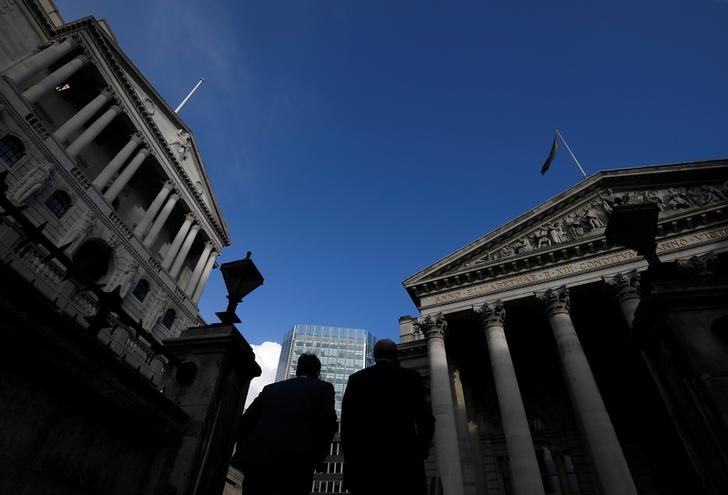 © Reuters. Workers emerge from Bank underground station with the Bank of England and Royal Exchange building seen in the City of London financial district, London, Britain
© Reuters. Workers emerge from Bank underground station with the Bank of England and Royal Exchange building seen in the City of London financial district, London, BritainBy David Milliken
LONDON (Reuters) – The Bank of England will be looking to see if Britain’s economy has recovered from a severe winter chill as it weighs the prospects for a future interest rate rise this week.
No economists polled by Reuters expect the BoE to raise rates on Thursday, and some are getting cold feet about their forecasts for a rate rise in August, which would be only the central bank’s second increase since the 2008 financial crisis.
Patchy growth as the economy prepares to leave the European Union in March next year places BoE policy in sharp contrast to the United States, where the Federal Reserve plans to raise rates four times in 2018, and three times in 2019.
“The Monetary Policy Committee will be wary of providing any firm guidance over the likely timing of the next hike as it won’t want to tie its hands,” BNP Paribas (PA:) economist Luigi Speranza said on Monday.
Goldman Sachs (NYSE:) currency strategists said sterling – which is already near a 2018 low – continued to price in too high a chance of an August move.
BoE Governor Mark Carney has said first-quarter weakness looks temporary and expects to rates to rise gradually over the next couple of years, to prevent overheating at a time of above-target inflation and the lowest unemployment since 1975.
But he has been much vaguer about precise timing. A putative May rate rise was thrown off course by an unusually harsh winter – and a possible underlying slowdown – that led to the economy almost stagnating from January to March.
A record proportion of the public in a BoE survey last month had no idea what would happen to rates over the coming year – perhaps reflecting Brexit uncertainty as well as BoE indecision.
Trade concerns exist outside Britain too. The Bundesbank sharply cut its growth forecast for Germany on Friday, partly due to worries that U.S. President Donald Trump may spark a trade war with his tariffs on European and Japanese steel.
HEDGING BETS
If it wishes, the BoE will have ample chance to bring clarity on Thursday, when the MPC will publish a statement at 1100 GMT and Carney is due to give a major speech at 2015 GMT.
But many economists expect the central bank to keep hedging its bets. Since its last meeting, inflation has fallen to a one-year low of 2.4 percent and April industrial output and construction data were strikingly weak.
However, business surveys for May have perked up, pointing to second-quarter growth of 0.3-0.4 percent, according to IHS Markit, a financial data company. This is just about in line with the maximum rate the BoE thinks the economy can sustain without causing too much inflation.
Wage growth has been solid if unspectacular, and May retail sales were strong, reflecting sunny weather, a royal wedding and a partial easing of the inflation pressure that has squeezed British consumer demand since June 2016’s Brexit vote.
Two BoE policymakers – Ian McCafferty, whose term ends in August, and Michael Saunders – are expected to stick with their view, held since March, that rates need to go up now.
The rest of the MPC are likely to conclude that there is little cost in waiting until at least August before deciding whether to raise rates, economists say.
Even then, it could find further reason to delay. A change to the Office for National Statistics’ publication schedule means second-quarter GDP data will not be released until after the BoE’s August rate meeting.
“August would be too much of a gamble and (we) see November as the next best opportunity for a hike, assuming data strengthens more than we expect and that Brexit remains free of major disruption,” Barclays (LON:) economists Fabrice Montagne and Sreekala Kochugovindan said.
To view a graphic on Bank of England hawks and doves, click: http://tmsnrt.rs/2eSYykb
To view a graphic on Key economic indicators for UK and euro zone economy, click: http://tmsnrt.rs/2byBv8u
Source: Investing.com




























